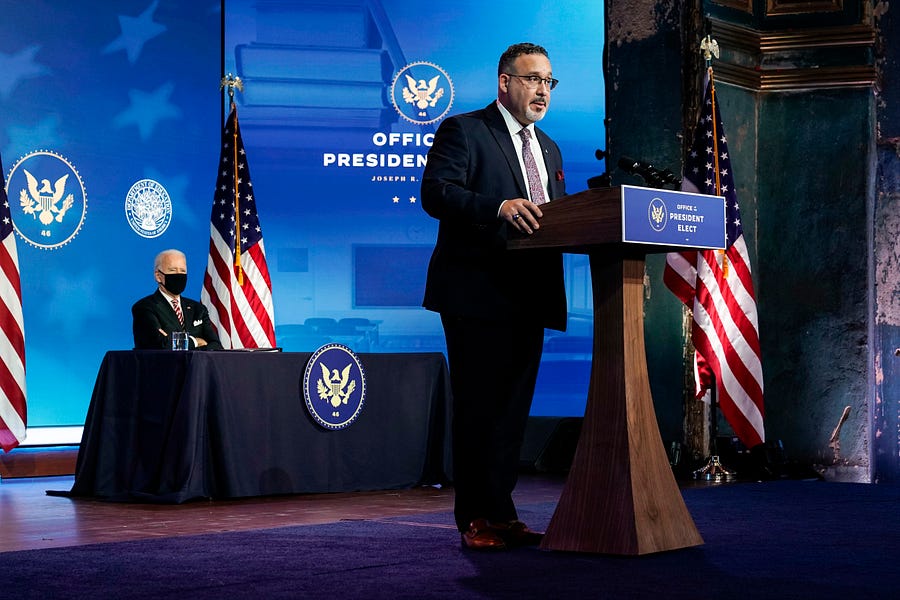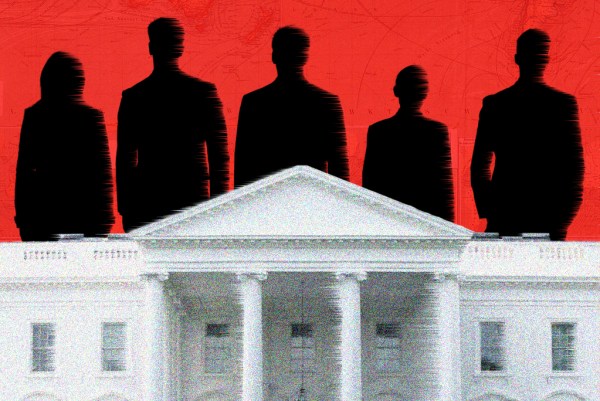In his inaugural address, President Biden called on Americans to bridge our divides, lower the temperature on our national debates, and work together to defeat the pandemic. He’s repeatedly said that one of his priorities is getting America’s kids back to school. All good and heartening notes.
Moments into his tenure, Biden then waded into the culture wars by issuing executive orders that dismantled the “1776 Commission” and declared that girls’ sports could no longer exclude biologically male athletes. His administration has signaled that more than $100 billion in new federal aid is necessary for “most” schools to open sometime this spring, even as some union leaders have hinted that schools may not be fully open even in the fall. And, on Biden’s second day in office, the first lady publicly welcomed the heads of the nation’s two major teacher unions to the White House, while lamenting how tough things are on teachers this year.
So, which will it be? Will Biden’s education agenda be one of common ground, lowered temperatures, and getting kids back to school—or will it be one of culture clashes, resurgent union power, and blue state schools that stay shuttered into fall 2021 (or even beyond)?
The most obvious tea leaf to read is Miguel Cardona, Biden’s nominee for secretary of education and a safe bet to be rapidly confirmed. Unfortunately, Cardona is very much a blank slate. Having spent most of his career out of the public eye—first as a classroom teacher, principal, and assistant superintendent in a smallish district in Connecticut, and the past 18 months as head of Connecticut’s education agency—Cardona has no clear public stance on charter schooling, testing, teacher unions, tenure, “reform,” higher education, and the rest.
This ambiguity has allowed Biden to sidestep intramural Democratic educational debates, which threatened to boil over in December, for instance, when it appeared Biden would nominate former National Education Association chief Lily Eskelsen Garcia. Biden had boxed himself in, having repeatedly promised on the campaign trail that he’d name a public educator to run the Department of Education. All of which made Cardona, a veteran teacher and principal who didn’t even qualify as a dark horse candidate 10 weeks ago, an appealing “stealth” nominee.
Cardona is a likable figure who touches key bases for Democrats. He has a heartwarming personal story. Cardona, whose parents moved to the mainland from Puerto Rico, grew up in a housing project, learned English as a second language, attended public colleges, returned to his hometown in Connecticut to teach elementary school, and went on to become Connecticut’s youngest principal at the age of 28. He says it’s vital to get kids back to school, speaks passionately about supporting vulnerable students, and waxes enthusiastically about public education.
The teacher unions (which were going to have to approve any Biden education secretary) have welcomed his appointment. So have charter school advocates, relieved that Biden didn’t name someone openly hostile to school choice. And the media has shed their DeVos-era playbook with amusing haste, rediscovering the ability to fawn. The Washington Post’s editorial board termed Cardona “an inspired choice to lead the nation’s schools” and the New York Times’ authoritative profile lacked even a single skeptical quote.
While Cardona may be a blank slate, the appointees who will serve with him suggest that the Biden education agenda may well be driven by the White House and make it pretty clear that the “reform” Democrats have been routed in the internal staffing wars.
First, there’s a history of the Department of Education sometimes being run rather aggressively from 1600 Pennsylvania Avenue. This was certainly the case during George W. Bush’s first term, when domestic policy chief Margaret Spellings and her team took the lead in negotiating No Child Left Behind and supervising state compliance. The department sometimes got wholly cut out of decisions, finding deals had been struck only after the fact.
Not only is Cardona a relative novice with no national experience and only a short stint as head of Connecticut’s education bureaucracy, but his deputy will be Cindy Marten, the superintendent of San Diego Unified School District, a longtime educator who has never worked at the state or federal level. Meanwhile, it’s been announced that the White House team will include two seasoned D.C. education hands and Obama education veterans: Carmel Martin, who oversaw department policy after a long career on Capitol Hill, and Catherine Lhamon, an unapologetic culture warrior who headed up the department’s Office of Civil Rights as it pursued controversial policies on Title IX, school discipline, and more.
The department looks like it’ll be on a short leash, with the shots called by the policy pros in the White House while the educators serve as its public face. (Strengthening that impression is that Sheila Nix, who previously served as chief of staff to Jill Biden and a senior adviser to Kamala Harris, has been named as Cardona’s chief of staff.) Just what a strong White House role might mean isn’t yet clear, though Lhamon’s role as “deputy director of the Domestic Policy Council for Racial Justice and Equity” suggests that the woke agenda may loom large.
Second, the department appointees announced thus far suggest that the unions and the progressive wing steamrolled the centrists when it came to staffing. None of the transition team members or Obama veterans championed by “reform” Democrats have been named thus far. While Cardona is a Rorschach test on charter schooling, his deputy-to-be Marten has been hostile. Indeed, she may be best known for San Diego’s controversial embrace of “anti-racist” dogma and her vocal doubts about school reopening.
The National Education Association supplied senior adviser for policy and planning Donna Harris-Aikens as well as principal deputy general counsel Emma Leheny. Suzanne Goldberg, founding director of Columbia Law School’s sexuality and gender law clinic, was named to a senior position at the Office of Civil Rights. Other early appointments come from the Elizabeth Warren campaign and state-based left-wing advocacy organizations. In short, this is not a staffing chart that portends a determined centrism.
Is the administration going to focus relentlessly on reopening schools and hold superintendents and union leaders to the euphonious promises that they’re eager to get kids back in school, or will it offer excuses as reopening efforts lag? Is it going to abide by Biden’s aspirational commitment to build bridges and lower the national temperature, or will it follow up his Day 1 dismantling of the “1776 Commission” by attacking school discipline, homework, and charter schooling as racist conceits, in accord with the expressed sentiments of key Department and White House deputies?
Back in September, in this space, I observed, “When it comes to domestic policy, the question is which President Biden would emerge: the affable Obamaphile centrist or the AOC sock puppet?” Five months on, when it comes to education, the answer remains elusive—but the Democrats’ AOC wing has to be feeling pretty good about the shape of things.
Frederick M. Hess is director of education policy studies at the American Enterprise Institute.








Please note that we at The Dispatch hold ourselves, our work, and our commenters to a higher standard than other places on the internet. We welcome comments that foster genuine debate or discussion—including comments critical of us or our work—but responses that include ad hominem attacks on fellow Dispatch members or are intended to stoke fear and anger may be moderated.
With your membership, you only have the ability to comment on The Morning Dispatch articles. Consider upgrading to join the conversation everywhere.